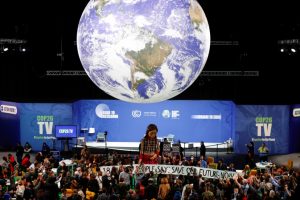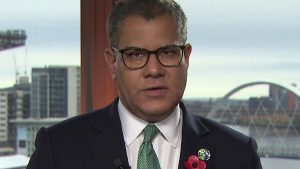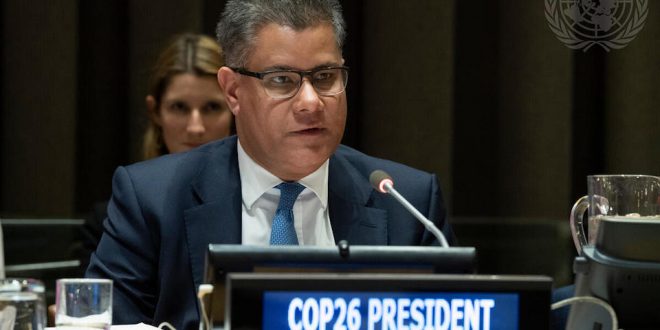15-11-2021
GLASGOW/ BEIJING/ NEW DELHI: China and India will have to explain themselves to climate-vulnerable nations, COP26 President Alok Sharma has said as the summit ends.
 It comes after the two nations pushed for the language on coal to change from “phase out” to “phase down” in the deal agreed in Glasgow but Sharma insisted the “historic” deal “keeps 1.5C within reach”.
It comes after the two nations pushed for the language on coal to change from “phase out” to “phase down” in the deal agreed in Glasgow but Sharma insisted the “historic” deal “keeps 1.5C within reach”.
It is the first ever climate deal that plans explicitly to reduce coal – the worst fossil fuel for greenhouse gases.
The summit, which was initially due to end on Friday, had to go into overtime before a deal was agreed late on Saturday – following the late intervention from India to water down the language on coal.
Later on Sunday, Prime Minister Boris Johnson will join Sharma to give a Downing Street news conference on the outcome of the climate summit.
Sharma said the deal struck in the Glasgow climate pact was a “fragile win” and urged China and India to “justify” their actions to nations that are more vulnerable to the effects of global warming.
He told BBC One’s Andrew Marr Show: “I am going to be calling on everyone to do more “but as I said,  in relation to what happened yesterday, China and India will have to explain themselves and what they did to the most climate-vulnerable countries in the world.”
in relation to what happened yesterday, China and India will have to explain themselves and what they did to the most climate-vulnerable countries in the world.”
Sharma, who had to hold back tears as he closed the summit following the late intervention, added: “I wouldn’t describe what we did yesterday as a failure – it is a historic achievement.”
One of the main goals set out by COP26 was to ensure we do not go above 1.5C by 2100 – which scientists have said would limit the worst impacts of climate change.
As part of the agreement struck in Glasgow, countries will meet next year to pledge further major carbon cuts with the aim of reaching the 1.5C goal. Current pledges, if fulfilled, will only limit global warming to about 2.4C.
Scientists have warned if global temperatures rise by more than 1.5C the Earth is likely to experience severe effects such as millions more people being exposed to extreme heat. The world is currently 1.2C warmer than it was in the 19th Century.
 Under the Glasgow climate pact:
Under the Glasgow climate pact:
Countries were asked to republish their climate action plans by the end of next year, with more ambitious emissions reduction targets for 2030
There is an emphasis on the need for developed countries to increase the money they give to those already suffering the effects of climate change – beyond the current $100bn annual target
The language about coal has been included for the first time ever in a global climate deal
A pledge in a previous draft to “phase out” coal was instead watered down to a commitment to “phase down” coal
The final deal agreed on has been met with some criticism.
Ed Miliband, shadow business and energy secretary, told the Sky News’ Trevor Phillips program that “keeping 1.5 degrees alive is frankly in intensive care”.
 He said the world’s task was to halve global emissions by 2030 and said that despite some progress in Glasgow “the world is only probably about 20% or 25% of the way to that goal” Miliband commended Sharma on his efforts.
He said the world’s task was to halve global emissions by 2030 and said that despite some progress in Glasgow “the world is only probably about 20% or 25% of the way to that goal” Miliband commended Sharma on his efforts.
Thbute UN’s climate change chief, Patricia Espinosa, described the mention of coal and fossil fuels as a “huge step forward” but she added that “we need to also balance out the social consequences for so many people around the world, especially in the poor countries”. Lord Deben, the chairman of the Climate Change Committee, told BBC Radio 4’s The World This Weekend that the UK should negotiate future trade deals with “some congruence with the world battle on climate change”, pointing to Australia as an example.
“I hope our government will also recognize that you really cannot sign trade deals on the basis that Australia can do nothing to insist on their farmers meeting the challenge of climate change and then export their goods to Britain,” he said.
 He added that India’s push to change the language on coal was a “misuse” of the process.
He added that India’s push to change the language on coal was a “misuse” of the process.
A report by the Climate Action Tracker group has calculated that at the current rate, the world is heading for 2.4C of warming by 2100.
If no action was taken, scientists believe global warming could exceed 4C in the future. This could lead to devastating heat-waves, droughts, extreme rainfall and floods. As a result, millions of people could lose their homes to rising sea levels.
In addition to this, the change in climate could lead to irreversible damage to our ecosystem with the extinction of animal and plant species.
 Pressmediaofindia
Pressmediaofindia




